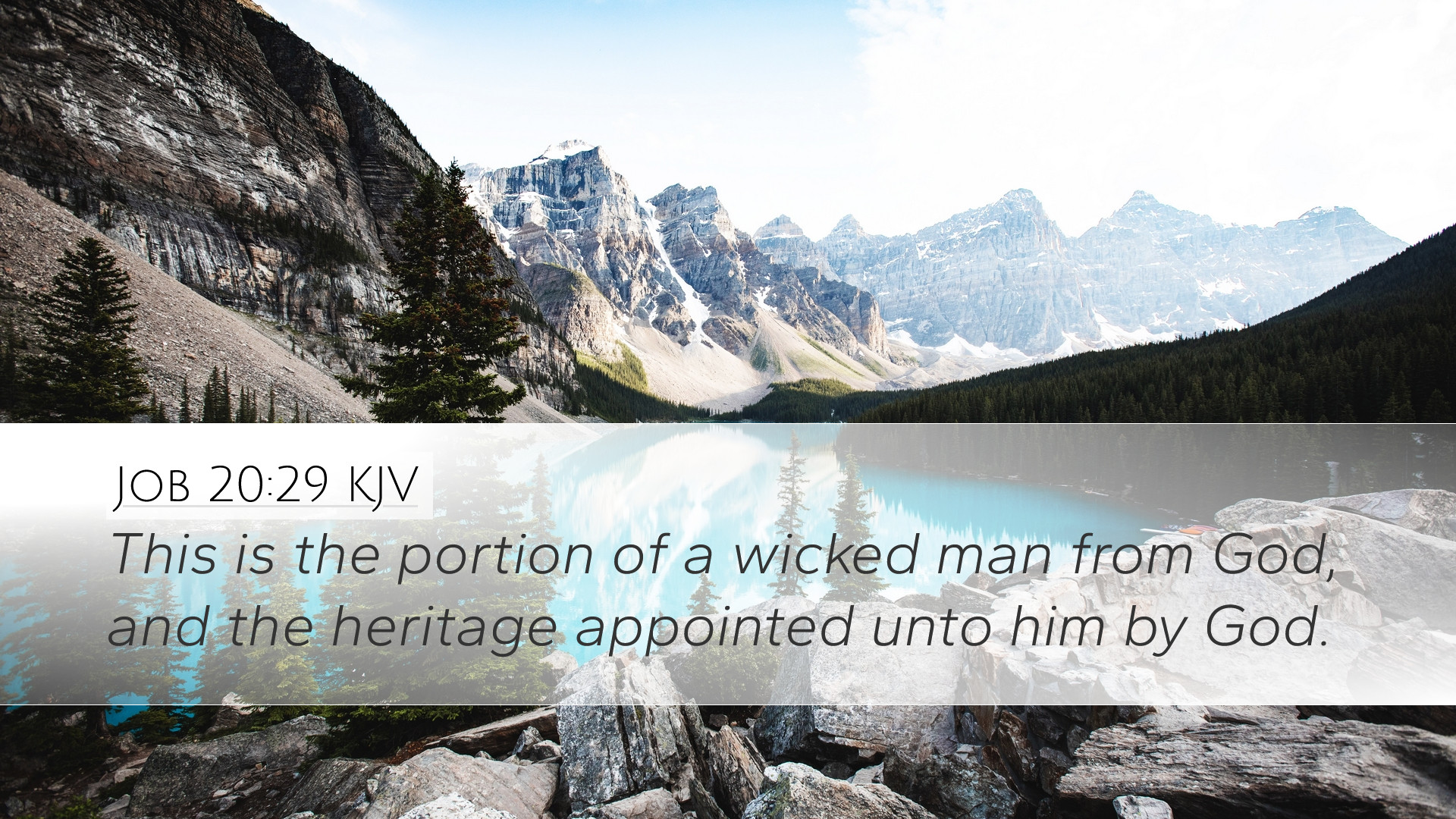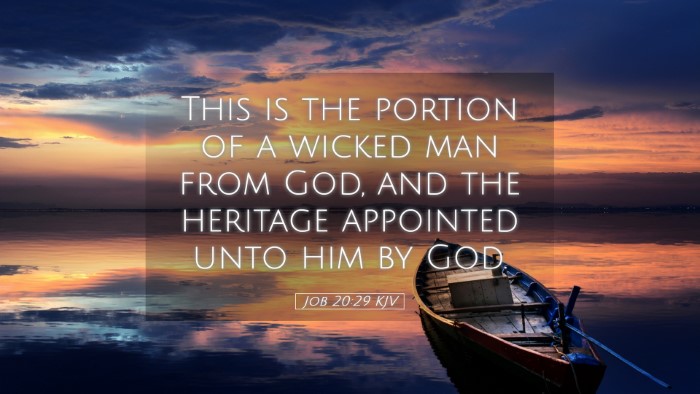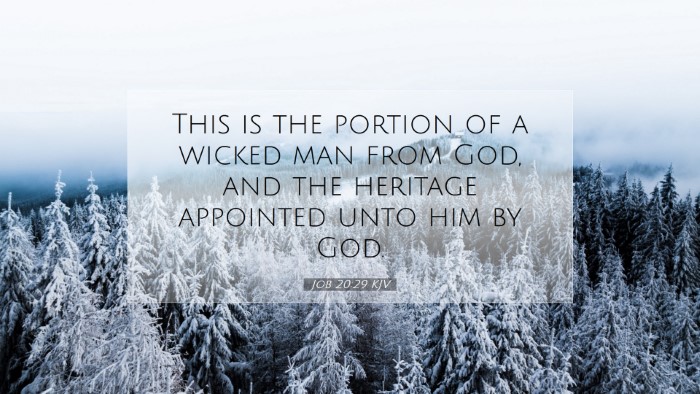Old Testament
Genesis Exodus Leviticus Numbers Deuteronomy Joshua Judges Ruth 1 Samuel 2 Samuel 1 Kings 2 Kings 1 Chronicles 2 Chronicles Ezra Nehemiah Esther Job Psalms Proverbs Ecclesiastes Song of Solomon Isaiah Jeremiah Lamentations Ezekiel Daniel Hosea Joel Amos Obadiah Jonah Micah Nahum Habakkuk Zephaniah Haggai Zechariah MalachiJob 20:29
Job 20:29 KJV
This is the portion of a wicked man from God, and the heritage appointed unto him by God.
Job 20:29 Bible Commentary
Commentary on Job 20:29
Verse: "This is the portion of a wicked man from God, and the heritage appointed unto him by God."
Introduction
The Book of Job stands as a profound exploration of suffering, righteousness, and divine justice. In this particular verse, Job’s friend Zophar declares the fate of the wicked, emphasizing that their lot is divinely appointed. This commentary draws from various public domain sources, notably the insights of Matthew Henry, Albert Barnes, and Adam Clarke, to unpack the theological and existential implications of Job 20:29.
Contextual Overview
This verse is situated within a dialogue between Job and his friends, particularly Zophar. It reflects the common belief of the time that righteousness leads to reward and wickedness leads to punishment. Zophar’s speech hinges on the perceived justice of God in human affairs, asserting that the destiny of the wicked is a manifestation of divine retribution.
Theological Implications
1. The Nature of Divine Justice:
- Zophar emphatically states that the fate of the wicked is determined by God’s justice, reflecting a fundamental principle that echoes throughout Scripture (see Psalm 1).
- Matthew Henry emphasizes that this verse showcases the certainty of divine judgment, warning the wicked of the consequences of their actions.
- Albert Barnes notes the seemingly unconditional nature of this judgment; it is not merely societal punishment but deeply theological, rooted in God’s sovereignty.
Understanding 'Wickedness'
2. The Characterization of a Wicked Man:
- According to Adam Clarke, the term "wicked man" refers to one who openly defies God and engages in unrighteous behavior.
- Henry expands on this by outlining the behaviors that characterize wickedness: pride, deceit, and an intentional departure from divine laws.
- This verse introduces a dichotomy that remains important: righteousness is inherently linked to divine favor, while wickedness aligns with divine disfavor and ultimate destruction.
The Portion and Heritage of the Wicked
3. Divine Appointments:
- The "portion" refers to what the wicked can expect – a fate decreed by God (Barnes). This idea signifies that even the fate of the wicked is under God’s control and part of His sovereign plan.
- Henry stresses that this inheritance is not only temporal but eternal in its scope, as it will culminate in ultimate judgment and separation from God.
- Moreover, Clarke posits that every individual reaps what they sow (Galatians 6:7), and this principle is encapsulated in God’s judgment on wicked behavior.
Practical Applications for Believers
4. A Call to Righteous Living:
- Understanding the ultimate judgment of the wicked serves as a profound call to believers to pursue righteousness (Henry). Zophar's assertion reflects a truth that resonates through both the Old and New Testaments.
- Pastors and church leaders can use this verse to encourage congregations to reflect on their own lives, ensuring adherence to God’s commandments and heart attitudes.
- Students of the Word should consider the implications of their actions, understanding that the choices made in life have eternal significance.
Hope for the Wicked
5. Redemption and Divine Mercy:
- While this verse illustrates the fate of the wicked, it also highlights the ever-present opportunity for repentance. As Barnes notes, God's judgment does not come without the possibility of grace and mercy.
- Clarke reminds us that even the wicked are invited to turn from their ways, reflecting the redemptive nature of God.
- This assertion extends hope to those who might identify with "wickedness," as they can find refuge in God’s mercy and desire for restoration through true repentance.
Conclusion
Job 20:29 serves as a poignant reminder of the justice of God and the inevitable consequences of wickedness. Through the insights of Matthew Henry, Albert Barnes, and Adam Clarke, it becomes evident that while the fate of the wicked is stark, the capacity for repentance and divine mercy remains a core truth of the Gospel. For pastors, theologians, and students, this verse invites deep reflection on the nature of God’s justice while offering the hope that is found in repentance and salvation.


